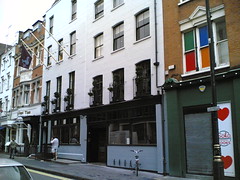I’m sitting in the posh confines of the Groucho Club in Dean Street, London, listening to a presentation by Nico Macdonald. During the last hour and a half, I’ve been having lunch with Nico during which we’ve talked about (mostly) the challenges of academics and the BBC [oops!] building meaningful, and mutually beneficial, relationships and collaborations.
Nico has been speaking, on behalf of the Arts and Humanities Research Council, with lots of people at [really big media company] about the use of academic knowledge, communication of research, opportunities for access to data and audiences, etc.
We’re going to spend the afternoon talking about how to bring the communities together. My preliminary thoughts…
* academic researchers need to start blogging initial thoughts, ideas and findings or industry will have moved on too far for their research to be relavent when it is finally published
* giving researchers access to data is difficult due to the data protection act
* academics would be a useful sounding board for ideas and students useful for audience research
So what now? Well, I’m almost always happy to speak to courses or individual students and academics about my work (so much as is possible) and do have a fairly steady stream of academic visitors. What I don’t get is much information from academics and students about the type of research they’re doing or things they’re interested in. One of Nico’s ideas is that people can act as connectors – so drop me an email or post a comment if you’re interested in starting a conversation.

I should note that I don’t represent the Arts and Humanities Research Council, and am in fact independent. I have been working with the new media division of said media organisation on a project to better connect academic research with design practice, and this has been co-funded by the AHRC. The presentation I gave wasn’t an AHRC presentation per se. Rather it represented thinking done by our team on possible models for sharing knowledge between academics and practitioners, and connecting them with a view to applying for joint research funding. It was intended to responses and ideas (which is did). The project in question is documented online at http://tell.memore.info/
I have great hope for this project, based on learning from the successes (and failures) of models in the human-computer interaction world, where I have been involved for many years with the British HCI Group and the US-based ACM Special Interest Group on Computer-Human Interaction (SIGCHI).